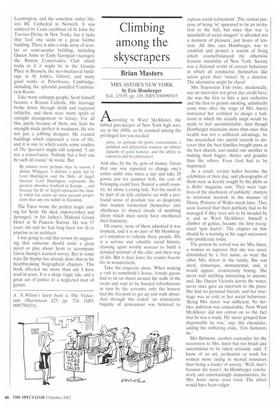Climbing among the
skyscrapers
Brian Masters
MRS ASTOR'S NEW YORK by Eric Homberger
Yale, £19.95, pp. 336, ISBN 0300095015
According to Ward McAllister, the fabled gate-keeper of New York high society in the 1890s, to be counted among the privileged few you needed
poise, an aptitude for polite conversation, a polished and deferential manner, an infinite capacity of good humour, and the ability to entertain and be entertained.
And also, by the by, pots of money. Given that one was expected to change one's entire outfit nine times a day and take 20 gowns just for summer hols, the cost of belonging could have floated a small country, let alone a young lady. Yet the need to be part of an icily exclusive set with a profound sense of position was so desperate that women tormented themselves into obedience to shared rituals of numbing idiocy which must surely have smothered their humanity.
Of course, none of them admitted it was torment, and it is no part of Mr Homberger's intention to ridicule these people. His is a serious and valuable social history, drawing upon worthy sources to build a detailed portrait of the elite and their way of life. But it does leave the reader bouche bee in wonderment.
Take the etiquette alone. When making a visit to somebody's house, female guests had to sit on chairs around the walls of the room and wait to be handed refreshments in turn by the servants; only the hostess had the freedom to get up and walk about. And through this ordeal 'an aristocratic frigidity of demeanour was believed to express social refinement'. The central purpose of being 'in' appeared to be an invitation to the ball, but since that was 'a minefield of social dangers' it afforded not a moment of pleasure, just hours of tension. All this, says Homberger, was to establish and protect a system of living which counterbalanced the otherwise frenetic instability of New York. Society was a fictional world of correct behaviour in which all conducted themselves like actors given their 'moves' by a director. The alternative might be chaos!
Mrs Stuyvesant Fish (who, incidentally, was an innovator not given due credit here; she was the first to hire a jazz orchestra and the first to permit smoking, admittedly some time after the reign of Mrs Astor) instructed her architect to design a ballroom in which the socially inept would be made to feel uncomfortable. And though Homberger maintains more than once that wealth was not a sufficient advantage, he has researched into parish records to discover that the best families bought pews at the best church, and outdid one another in making them bigger, shinier and grander than the others. Even God had to be impressed.
As a result, society ladies became the celebrities of their day, and photographs of them were as keenly sought by the plebs as is Hello! magazine now. They were 'captives of the machinery of publicity', martyrs to irrational stardom in the manner of Diana, Princess of Wales much later. They soon learned that their publicity had to be managed if they were not to be invaded by it, and so Ward McAllister, himself a climber of genius, became the first recognised 'spin doctor'. The chapter on him should be a warning to his eager successors who proliferate today.
The person he served was the Mrs Astor, a woman so superior that she was never diminished by a first name, as were the other Mrs Astors in the family. She was aloof, statuesque, monumental, and, it would appear, monstrously boring. She never said anything interesting to anyone, and, like Queen Victoria across the water, never once gave an interview to the press. She had no personal friends, and her marriage was as cold as her social behaviour. 'Being Mrs Astor' was sufficient. No further ambition was conceivable. Poor Ward McAllister did not cotton on to the fact that he was a toady. He 'never grasped how dispensable he was,' says this chronicler, adding the withering coda, 'Few flatterers do.'
Mrs Belmont, another contender for the succession to Mrs Astor but too brash and ostentatious to be taken seriously, said, 'I know of no art, profession or work for women more taxing in mental resources than being a leader of society.' Well, that's because she wasn't. As Homberger conclusively and entertainingly demonstrates, the Mrs Astor never even tried. The effort would have been vulgar.




































































 Previous page
Previous page